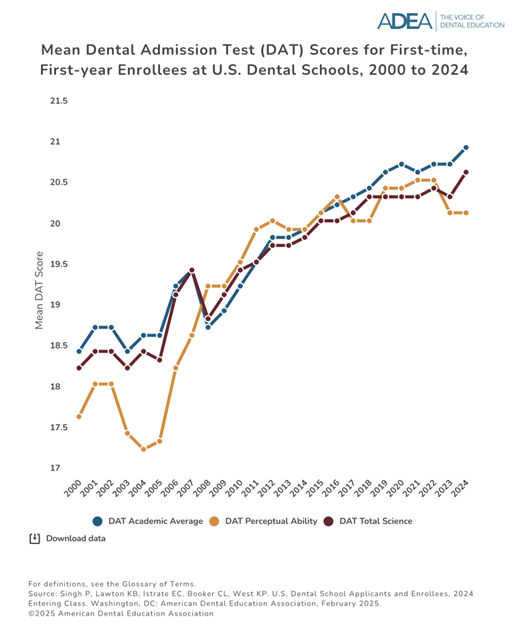
What Is a Good DAT Score?
For the student looking to apply to dental school, understanding what different DAT scores mean for one’s application is crucial. This article will discuss DAT score ranges and their relation to application competitiveness.
Prior to reading further, we recommend checking out our other article, which outlines how the DAT is scored. You can view this article here.
I. DAT Score Trends
When setting goals for the DAT, it is important to understand the historical trend of DAT scores. Looking at data from the ADA, a clear uptrend in all sections of the DAT for all dental school applicants can be seen. The DAT is becoming more competitive over time, requiring higher performance from each subsequent year of applicants.

With this context in mind, we have created five categories that DAT scores fall into in terms of competitiveness. The categories are grouped by the Academic Average (AA) score; however, the reasoning behind each category can be applied to all sections.
- 1. Retake (<370)
- With an AA of less than 370, a retake is necessary. This score is significantly below the average for all test takers and will prohibit your entry to dental school. In fact, many schools will not consider an application if a single subject is less than 370.
- 2. Below Average & Uncompetitive (370-390)
- An AA of 370-390 means you underperformed the average for all applicants. Unfortunately, this is no longer competitive as the average DAT score is increasing. A retake is strongly recommended. However, there are plenty of dental students who have gained admission with these scores. While your chances of admission are low, a score in this category is a liability to your application rather than an asset.
- 3. Average (400-420)
- Receiving a 400-420 AA on the DAT puts one at the lower end of the competitive range for admission. Many students gain admission with the equivalent of a 400-42019-20 AA in the old scale, which is great news! The main thing to ensure you have with this score is a well-rounded, pristine application that is submitted early. While this score range is not necessarily negative, it does not distinguish an applicant from the general pool. Therefore, you will need to use the rest of your application to highlight your strengths and qualifications to convince admissions committees to admit you.
- Since it is possible to get into dental school with this score, a retake is not 100% necessary. In fact, serious thought should be given before a retake attempt, as a lower second score will severely hurt your application. However, if you applied and had an unsuccessful cycle with a 400-420 AA, improving your score will significantly raise your chances of admission.
- 4. Competitive (440-470)
- Receiving a 440-470 AA is a major accomplishment and should be celebrated as such! With this score, you have sufficiently demonstrated your ability to learn, understand and apply the foundational knowledge necessary to succeed in dental school. There is no need for a retake with this score; in fact, we advise against it, as it is not worth the risk of receiving a lower score. If you have a 440-470 AA and are still having trouble gaining acceptance, improving other aspects of your application or interview is a more productive use of your time than retaking the DAT.
- 5. Highly Competitive (500+)
- Scoring a 500+ AA distinguishes one from the entire application pool. This score is projected to fall within the 1-3 percentiles of test-takers, based on preliminary concordance data from the ADA. Dental schools will take your application very seriously and your probability of acceptance is high. With this score, you can definitively check the DAT off your application to-do list. A lack of acceptance with this score means there is a glaring issue with the rest of your application. For such a situation, we recommend utilizing any free or paid application review resources to identify and remedy such weaknesses, such as our application services.
II. Conclusion
These five categories are general guidelines to appraise one’s DAT score and to help set goals at the onset of studying. While useful, it’s important to keep in mind that the average DAT score of accepted students (as seen below) is typically higher than the average score of all applicants, meaning the competitiveness of your score ultimately depends on the schools you’re targeting.

A “good” DAT score is relative and should be assessed in the context of each dental school’s most recent class average - many schools publish this information publicly. Even if your score falls below the national acceptance average, a strong GPA, compelling personal statement, meaningful experiences, and outstanding letters of recommendation can still make you a viable candidate. With the trend of reviewing applications holistically, making sure the rest of your application is of high quality is necessary, no matter your DAT score.